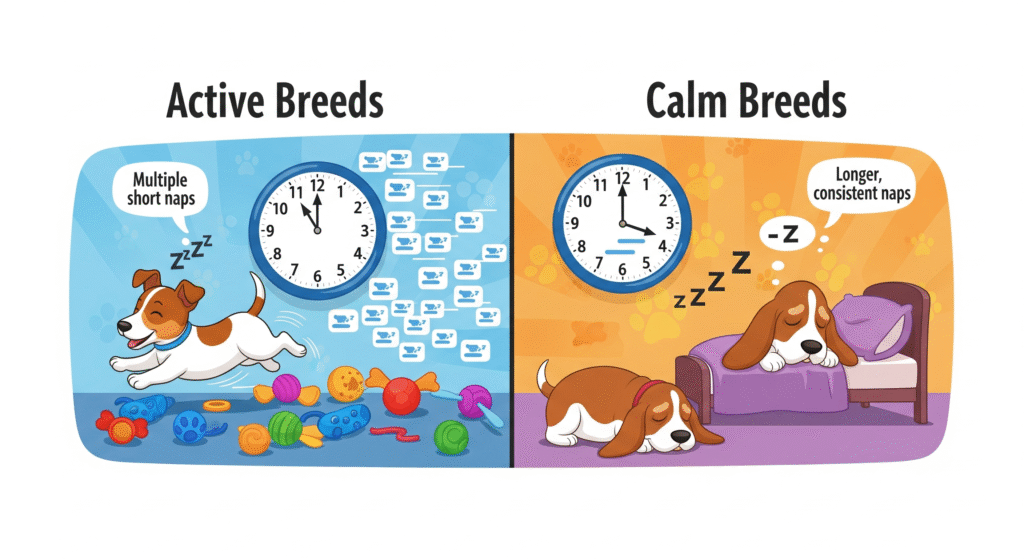
Bringing home a new puppy is exciting, but it can also be overwhelming—especially when it comes to figuring out how much sleep your furry friend really needs. Puppies grow quickly, and just like babies, they need plenty of rest to stay healthy and happy. The tricky part? Different breeds have different energy levels, growth rates, and rest requirements.
In this guide, we’ll walk you through how to create a sleep schedule that works for your puppy’s breed, age, and lifestyle so both of you can enjoy peaceful nights and productive days.
Why a Puppy Sleep Schedule Matters 🕒
A consistent puppy sleep schedule helps regulate their energy, supports brain development, and prevents behavioral problems. Without enough rest, puppies can become cranky, hyperactive, or even more prone to nipping and chewing.
A proper sleep schedule also helps:
- Support healthy growth and muscle development
- Improve focus during training
- Reduce anxiety and overstimulation
- Promote better digestion and overall health
How Much Sleep Do Puppies Really Need?
On average, puppies sleep 18–20 hours a day in their early weeks. As they grow, their sleep time gradually decreases, but it still remains more than an adult dog’s.
Here’s a general guide:
- 0–3 months: 18–20 hours a day (short bursts of play between naps)
- 3–6 months: 15–18 hours a day
- 6–12 months: 12–16 hours a day
- Adult dogs: 12–14 hours a day
Remember, these are averages—breed type plays a huge role in whether your puppy will lean toward the higher or lower end of the range.
Breed-Specific Sleep Needs 🐾
1. Small Breeds (Chihuahua, Pomeranian, Toy Poodle)
Small dogs often have bursts of high energy followed by long naps. They may need slightly less sleep overall compared to giant breeds, but they still benefit from frequent rest periods throughout the day.
Tip: Schedule multiple short naps to prevent overtiredness and mood swings.
2. Medium Breeds (Beagle, Cocker Spaniel, Border Collie)
Medium breeds are often active and curious, so they need plenty of stimulation between naps. They might nap less during the day but will still need solid rest at night.
Tip: Provide mental enrichment—like puzzle toys—before naps to help them settle faster.
3. Large Breeds (Labrador Retriever, German Shepherd, Golden Retriever)
Large breeds grow fast and need extra rest to support their bones and muscles. They can be more laid-back but may sleep longer after intense exercise.
Tip: Ensure a comfortable, orthopedic-style bed to support growing joints.
4. Giant Breeds (Great Dane, Mastiff, Saint Bernard)
Giant breed puppies are like gentle giants in training—they sleep a lot to fuel their rapid growth. They often need the highest amount of rest among all breeds.
Tip: Keep activity low-impact to avoid joint strain during growth.
Tips for Setting a Healthy Sleep Routine
- Create a Quiet, Cozy Space – Your puppy should have a comfortable, draft-free spot to rest without interruptions.
- Keep a Consistent Schedule – Feed, play, and potty breaks should happen at similar times each day to help your puppy’s body clock adjust.
- Balance Play and Rest – Too much excitement before bedtime can make it harder for your puppy to settle down.
- Use Crate Training Wisely – A crate can be a safe den-like space that encourages rest and prevents nighttime wandering.
- Consider Breed Energy Levels – Match your daily activities to your puppy’s breed. A Border Collie will need more active play than a Bulldog before bedtime.
Signs Your Puppy Is Overtired 😴
Overtired puppies may:
- Become more mouthy or nippy
- Struggle to settle down
- Bark excessively
- Ignore basic commands they usually know
If you notice these signs, it’s a cue your puppy needs more naps during the day.
Sample Sleep Schedule for Puppies
Here’s an example for a 3–6 month old medium breed puppy:
- 7:00 AM – Wake up & potty
- 7:15 AM – Breakfast
- 8:00 AM – Short play session
- 8:30–10:30 AM – Nap
- 10:30 AM – Potty & light play
- 12:00 PM – Lunch (if still on 3 meals)
- 1:00–3:00 PM – Nap
- 3:00 PM – Training & play
- 4:00–5:00 PM – Nap
- 5:30 PM – Dinner
- 7:00 PM – Walk or play
- 8:00–9:00 PM – Wind down time
- 9:00 PM – Final potty break & bedtime
Final Thoughts
Choosing the right puppy sleep schedule for your breed isn’t just about the number of hours—they also need the right balance of play, training, and downtime. Pay attention to your puppy’s signals, adjust the routine as they grow, and you’ll have a happy, well-rested companion who’s ready to learn and explore the world with you.
A good night’s sleep starts with the right plan—so set that schedule, stick to it, and enjoy those peaceful puppy snoozes! 🐾💤 PetsDogPuppy
